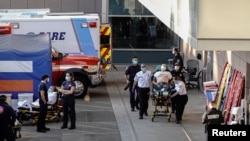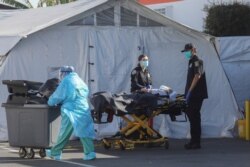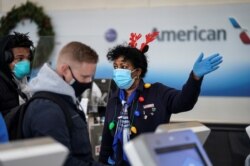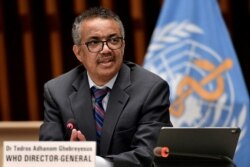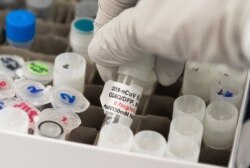The western U.S. state of California is expected to extend strict stay-at-home orders Tuesday for residents in two major areas of the state as it struggles with increasing numbers of new COVID-19 infections.
Governor Gavin Newsom said Monday it was “self-evident” that the restrictions first imposed three weeks ago for central San Joaquin Valley and Southern California will be extended as intensive care units in hospitals are filled or nearly filled to capacity. San Joaquin Valley is home to California’s vital agricultural sector, while Southern California includes the major cities of Los Angeles and San Diego.
The situation has become so dire that hospitals in those regions have been turning away patients seeking emergency care and erecting tents as makeshift treatment rooms to treat the overflow of COVID-19 patients.
California has become the latest epicenter of the coronavirus pandemic in the United States. According to figures compiled by Johns Hopkins Coronavirus Center, the state has 2,192,694 total confirmed COVID-19 infections, including 24,419 deaths. Governor Newsom warned Monday that the state was about to undergo a “surge on top of a surge, arguably on top of another surge” as many Californians ignored urgings from health experts not to travel during the Christmas and New Year’s holidays.
U.S. officials said nearly 1.3 million people went through U.S. airports on Sunday following the Christmas holiday, the highest level of air travel in more than nine months.
India is the latest nation to report discovery of a new variant of the novel coronavirus scientists say is far more contagious than the initial strain.
The Health Ministry says six people who returned to India from Britain in recent weeks have tested positive for the new strain. The six patients and their close contacts have been placed in isolation, and the ministry says it has tracked down their fellow travelers.
India has suspended all flights from Britain until the end of the month, joining such countries as South Korea, Finland, Japan and Saudi Arabia.
The head of the World Health Organization is calling for an increase in genomic sequencing of the coronavirus after new variants have been detected in Britain and South Africa.
WHO Director-General Tedros Adhanom Ghebreyesus said at an online news conference Monday from Geneva that "only if countries are looking and testing effectively, will you be able to pick up variants and adjust strategies to cope."
He said WHO is working closely with scientists worldwide to "better understand any and all changes to the virus" and their impacts, and he called on countries to share any genetic information with WHO and other countries.
British authorities are expected to approve the AstraZeneca coronavirus vaccine this week. If approved, AstraZeneca’s vaccine will become the fifth to have been rolled out to fight the virus. Early tests showed that the vaccine was 70% effective for preventing illness, compared to 95% reported by Pfizer and its German partner BioNTech. Russia and China also have their own vaccines.
South Korea’s Yonhap news agency is reporting that U.S. pharmaceutical firm Moderna has agreed to supply 20 million doses of its new COVID-19 vaccine to the Asian nation. Yonhap says the South Korean presidential office confirmed the agreement had been reached after a videoconference Monday between President Moon Jae-in and Moderna CEO Stephane Bancel.
The agreement comes as South Korea reported 40 new COVID-19 fatalities, its highest single day figure since the start of the pandemic, raising its total death toll to 859. Health officials also confirmed 1,046 new coronavirus cases, bringing the total number of confirmed cases to 58,725.
Also Monday, another COVID-19 vaccine candidate is beginning its final-stage testing in the United States. The testing for the vaccine candidate, made by Novavax, will involve 30,000 volunteers to determine whether the vaccine is effective and safe.
The trials will focus on high-risk older adults, as well as people from Black and Hispanic communities who have been disproportionately affected by the virus.
The latest vaccine on the horizon comes as the world reached the grim milestone of 81 million people worldwide infected by the virus with 1.7 million world deaths globally, according to Johns Hopkins University. The United States leads the world in both the number of total infections with 19.2 million and deaths with over 334,000 people.




